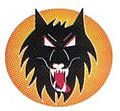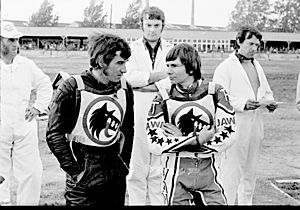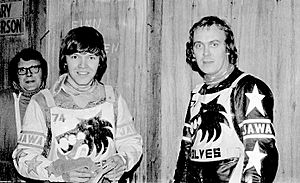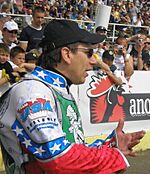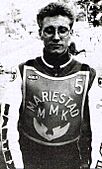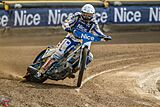Wolverhampton Wolves facts for kids
Quick facts for kids Wolverhampton Wolves |
|||||||||
|---|---|---|---|---|---|---|---|---|---|
| Club information | |||||||||
| Track address | Monmore Green Stadium Wolverhampton |
||||||||
| Country | England | ||||||||
| Founded | 1928/1951 | ||||||||
| Closed | 2023 | ||||||||
| Team manager | Peter Adams | ||||||||
| Club facts | |||||||||
| Colours | Old Gold and Black | ||||||||
| Track size | 264 metres (288.7 yd) | ||||||||
| Track record time | 52.69 | ||||||||
| Track record date | 29 August 2016 | ||||||||
| Track record holder | Niels Kristian Iversen | ||||||||
| Major team honours | |||||||||
|
|||||||||
The Wolverhampton Wolves were a famous British motorcycle speedway team. They were based in Wolverhampton, England. The team won the championship of the United Kingdom five times. They raced at the Monmore Green Stadium for many years, from 1928 until 2023.
Contents
Team History
Early Days: 1928–1930
Speedway racing, which was then called "Dirt Track racing," first happened at Monmore Green Stadium on May 30, 1928. The first time the Wolverhampton team name was used was in a race against Manchester on August 25. After a few more races in 1929 and 1930, speedway took a break in Wolverhampton for twenty years.
Return of Speedway: The 1950s
After World War II, speedway became very popular across the country. Many towns wanted to bring the sport back. In 1950, a man named Arthur Simcock got permission to restart speedway in Wolverhampton. The first official race for the team, now called the Wolverhampton Wasps, was in October 1950. In 1951, the Wasps joined the 1951 Speedway National League Division Three.
In 1953, another team, Cradley Heathens, joined with the Wasps. This was exciting for fans, and sometimes so many people came that the stadium was full! However, the team had some tough times in 1954, and speedway stopped in Wolverhampton again for a few years.
Wolves Rise: The 1960s
Speedway returned to Monmore Green in 1961, and the team was now known as the Wolverhampton Wolves. After two good seasons, they won their first big trophy in 1963. They became champions of the 1963 Provincial Speedway League. Key riders like Tommy Sweetman, Graham Warren, Maury Mattingley, Dave Hemus, and Rick France helped them win the league by just two points.
From 1965, the Wolves started competing in the top league, the British League. They finished in the middle of the table for a few years.
Star Riders and Trophies: The 1970s
Before the 1970 season, the Wolves signed Ole Olsen, a champion rider from Denmark. He was one of the best riders in the world and quickly made a huge difference for the team. In 1972, Ole Olsen won the British League Riders' Championship.
In 1973, the Wolves won the Midland Cup. The next year, they reached the final again. The 1975 season was a sad one because rider Gary Peterson passed away during a race. After 1975, Ole Olsen left the team. The Wolves then struggled for a while. However, they signed another young Danish star, Hans Nielsen, in 1978. He was only 18 but quickly became the team's top rider in 1978 and 1979.
Challenges and Comebacks: The 1980s
Hans Nielsen continued to be the top rider in 1980, but the team faced financial difficulties. The Wolves stopped racing for two seasons.
In 1984, a new promoter named Peter Adams brought the team back. In 1986, the Wolves signed Sam Ermolenko from the USA. With Sam and other talented riders from Denmark and America, the team became very strong. They finished third in 1986 and second in 1989.
Championship Glory: The 1990s
The Wolves won their first top-league championship in 1991, winning the 1991 British League season. Their American star, Sam Ermolenko, was a key player. Other important riders included Ronnie Correy, Sam's brother Charles Ermolenko, and Englishman Graham Jones. They beat Bradford to win the title.
In 1996, the Wolves won the championship again, making it their second title in six years. Ronnie Correy was the only rider left from the 1991 winning team. This time, two Swedish brothers, Peter Karlsson and Mikael Karlsson, were the stars. They scored many points and helped the team win. The Wolves also won the Knockout Cup in 1996.
More Success: The 2000s
The Wolverhampton Wolves became champions of the Sky Sports Elite League in 2002. They finished second in the regular season but won the play-off final against the Eastbourne Eagles. This was their third championship in 11 years. The Swedish Karlsson brothers, Peter and Mikael, were still very important to the team. In 2004, the Wolves reached the play-off final again but lost.
In 2009, the Wolves won the championship once more, beating the Swindon Robins in the play-offs. Freddie Lindgren was the top rider for the 2009 team. Veteran Peter Karlsson and young rider Tai Woffinden also scored many points.
Final Years: The 2010s and 2020s
The Wolves reached another play-off final in 2010 but lost. In 2016, they became champions of the United Kingdom for the fifth time! They beat the Belle Vue Aces in the play-off final. Led by Tai Woffinden and Freddie Lindgren, they won by a total of 10 points over two races.
In 2017, the Wolves lost another close play-off final to Swindon. The team continued to compete in the top league. After the leagues were cancelled in 2020 due to the COVID-19 pandemic, the team finished well in 2021, 2022, and 2023, reaching the play-offs each year.
Sadly, in 2023, the owners of Monmore Green Stadium announced that speedway would no longer be held there after the 2023 season. The Wolverhampton Wolves team officially stopped racing after that year.
Notable Riders
Many talented riders have raced for the Wolverhampton Wolves over the years. Some of the most well-known include:
 Jim Airey
Jim Airey James Bond
James Bond Ronnie Correy
Ronnie Correy Bruce Cribb
Bruce Cribb Preben Eriksen
Preben Eriksen Sam Ermolenko
Sam Ermolenko Andy Grahame
Andy Grahame Billy Hamill
Billy Hamill Dave Hemus
Dave Hemus George Hunter
George Hunter Norman Hunter
Norman Hunter Peter Jarman
Peter Jarman Jesper B. Jensen Monberg
Jesper B. Jensen Monberg Mikael Karlsson Max
Mikael Karlsson Max Peter Karlsson
Peter Karlsson Fredrik Lindgren
Fredrik Lindgren Sam Masters
Sam Masters Dave Morton
Dave Morton Hans Nielsen
Hans Nielsen Ole Olsen
Ole Olsen Nicki Pedersen
Nicki Pedersen Gary Peterson
Gary Peterson Peter Ravn
Peter Ravn Rory Schlein
Rory Schlein Bobby Schwartz
Bobby Schwartz Dennis Sigalos
Dennis Sigalos Jan Staechmann
Jan Staechmann Tommy Sweetman
Tommy Sweetman Finn Thomsen
Finn Thomsen Graham Warren
Graham Warren Tai Woffinden
Tai Woffinden
Olympique Races
The Wolves used to host a special race event called the Olympique every year.
 | Selma Burke |
 | Pauline Powell Burns |
 | Frederick J. Brown |
 | Robert Blackburn |


